| 1 |
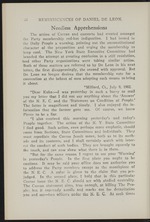 |
“...;4 REMINISCENCES OF DANIEL DE LEON.
Needless Apprehensions
The action of Curran and consorts had created amongst
the Party membership red-hot indignation. I had issued in
the Daily People a warning, pointing out the unconstitutional
character of the proposition and urging the membership to
keep cool. The New York State Executive Committee had
branded the attempt at creating confusion in a stiff resolution,
Sand other Party organizations were taking similar action.
Both of these matters are referred to by De Leon in his next
letter, the first disapprovingly, the second with approval. But
De Leon no longer desires that the membership vote for a
convention at the behest of men adopting such means to bring
it about.
Milford, Ct., July 9, 1902.
Dear Kuhn;was yesterday in such a hurry to mail
you my letter that I did not say anything about the Answer
of the N. E. C. and the Statement on Condition of People.
The latter is magnificent and timely. I also enjoyed the in-
formation that the former...”
|
|
| 2 |
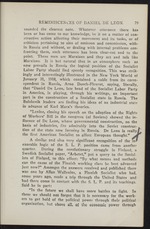 |
“...construction of a Socialist state in Russia. The
Bolshevik leaders are finding his ideas of an industrial state
in advance of Karl Marxs theories.
"Lenine, closing his speech on the adoption of the Rights
of Workers Bill in the congress (of Soviets) showed the in-
fluence of De Leon, whose governmental construction, on the
basis of industries, fits admirably into the Soviet construc-
tion of the state now forming in Russia. De Leon is really
the first American Socialist to affect European thought.
A similar and also very significant recognition of the in
exorable logic of the S. L. P. position came from another
quarter. During the revolutionary struggle in Finland, a
Swedish Socialist paper, Arbetet, put a query to the Social-
ists of Finland, to this effect: "By what means and methods
can the cause of the Finnish working class be best advanced
Just now? Amongst the answers received and published there
was one by Allan Wallenius, a Finnish Socialist who had,
some years ago, made a trip through the...”
|
|
| 3 |
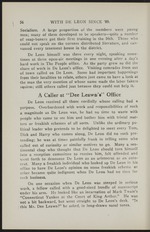 |
“...received all those cordially whose calling bad a
purpose. Overburdened with work and responsibilities of such
a magnitude as De Leon was, he had no time to waste with
people who came to see him and bother him with trivial mat-
ters or freakish schemes of all sorts. Unlike the ordinary po-
litical leader who pretends to be delighted to meet every Tom,
Dick and Harry who comes along, De Leon did no such pre-
tending; he was at times painfully frank in telling some who
called out of curiosity or similar motives to go. Many a sen-
timental chap who thought that De Leon should turn himself
into a reception committee to receive him, felt offended and
went forth to denounce De Leon as an aristocrat or an auto-
crat. Many a freakish individual who looked up De Leon in his
office to have De Leons opinion on some freakish scheme or
other became quite indignant when De Leon had no time for
such business.
On one occasion when De Leon was steeped in serious
work, a fellow called with a good-sized bundle...”
|
|
| 4 |
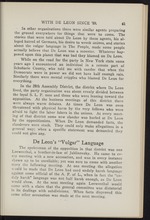 |
“...WITH DE LEON SINCE 89. 61
In other organizations there were similar agents preparing
the ground everywhere for things that were to come. The
stories that were told about De Leon by these agents, his al-
leged hatred of Germans, his desire to wreck unions, and stories
about the vulgar language in The People, made some people
actually believe that De Leon was a monster. Whatever hap-
pened upon this planet that was bad they blamed on De Leon.
While on the road for the party in New York state some
years Ago I encountered an individual in a remote part of
Schoharie County, who told me with candor that when the
Democrats were in power we did not have half enough rain.
Similarly there were mental cripples who blamed De Leon for
everything.
In the 28th Assembly District, the district where De Leon
lived, the party organization was about evenly divided between
the loyal S. L. P. men and those who were leaning toward the
opposition. At the business meetings of this district there
were always warm...”
|
|
| 5 |
 |
“...tale of De Leons using bad language at the meeting of the
28th A. D. This bad language, as upon inquiry I found out,
amounted to this: De Leon when referring to Loewenthal,
which means when translated into English, lions dale, referred
to him as Comrade Lions Tail, or in German, the language
spoken at the meetings of the 28th Assembly District, as
Genosse Loewenschwantz. This was the horrible language
used by De Leon, and it was quite excusable at that, for there
were a number of men about with similar names, like Loewen-
fuss, etc.
Opposition Organized
With the advent of the year 1899 it became apparent that
the opposition had effected some sort of organization on a na-
tional scale. Connections had evidently been established by
the New York oppositionists with those of other cities. At
any rate the disgruntled elements were getting bolder and more
and more boisterous and bothersome generally. Instead of de-
voting the time to agitation work, party meetings were dragged
out for hours with...”
|
|
| 6 |
 |
“...raised that the Alliance had
scabbed in the Davis shop many who were friendly disposed
toward the Alliance were taken off their feet. To hear that an
A. F. of L. body has scabbed on another A. F. of L. organiza-
tion or upon unorganized workers does not as a general rule
come as a surprise; that is an everyday occurrence. The charge
sounds different, and rightly so, when made against a Socialist
organizationjust as everyone is jarred when a Socialist i.s
sent to prison for wife-beating or a similar offence, while no
one is at all astonished that Democrats, Republicans, and In-
dependents fill the prisons and jails. A heinous crime com-
mitted by a member of the Socialist Labor Party would create...”
|
|
| 7 |
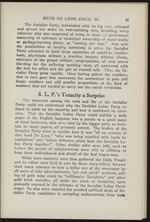 |
“...by the majority and how it continued its exist-
ence. That the Socialist Labor Party could publish a daily
paper in the English language was a puzzle to a good many
of these innocents, who were bled by the bigger party to main-
tain Its nwny papers, all privately owned. The leaders of the
Socialist Party tried to explain how it was "all on account of
that fiend De Leon, who was being supplied with funds by
capitalists, and whose influence alone kept the Socialist La-
bor Party together. Other similar tales were told, such as
before the period of enlightenment were told to children to
keep them well-behaved and afraid of the bad bogey-man.
While mere numbers were thus gathered the Daily People
and Its editor were held in awe by these story-tellers, because
their many schemes to turn a dollar out of the movement by
all sorts of fake advertisements, get rich quick methods sell-
ing of pld mine stock by millionaire Socialists, and other
gold brick swindles, all under the cloak of Socialism were...”
|
|
| 8 |
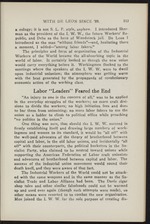 |
“...hucksters in the So-
cialist Party, who claimed to be neutral toward unions while
supporting the American Federation of Labor craft unionists
and advocates of brotherhood between capital and labor. The
success of the industrial union movement would sound their
death knell, and they were aware of that fact.
The Industrial Workers of the World could not be attack-
ed with the same weapons and in the same manner as the So-
cialist Trade and Labor Alliance had been. The Davis cigar
shop tales and other similar falsehoods could not be warmed
up and used over again (though such attempts were made), so
other means were resorted to to combat the new organization.
Men joined the I. W. W. for the sole purpose of creating dis-...”
|
|
| 9 |
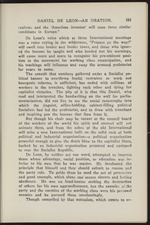 |
“...DANIEL DE LEON-^AN ORATION.
183
realism; and the American invasion will soon force similar
conditions in Europe.
De Leons voice which at three International meetings
was a voice crying in the wilderness, Prepare ye the wayl
will swell into louder and louder tones, and those who ignor-
ed the lessons he taught and who heeded not his warnings,
will come more and more to recognize his pre-eminent posi-
tion in the movement for working class emancipation, and
his teachings will influence and sway the aroused proletariat
for years to come.
The conceit that numbers gathered under a Socialist po-
litical banner to overthrow feudal restraints or work out
bourgeois reforms, is sufficient, has ended with millions of
workers in the trenches, fighting each other and dying for
capitalist victories. The pity of it is that this Daniel, who
read and interpreted the handwriting on the wall for parlia-
mentarianism, did not live to see the social catastrophe into
which the jingoist, office-holding, cabi...”
|
|
